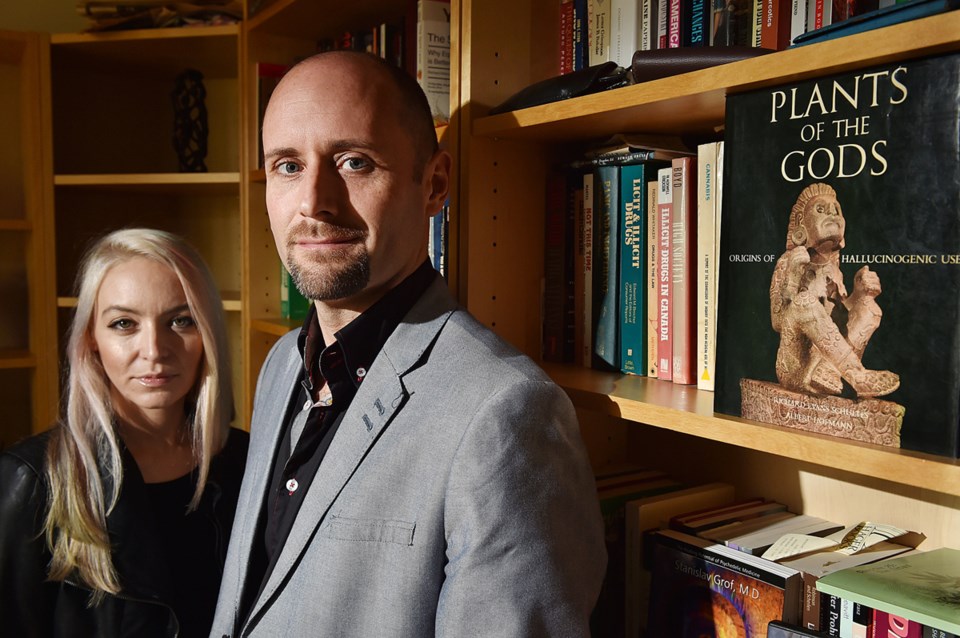Cannabis for cancer, MDMA for post-traumatic stress disorder (PTSD) and psilocybin for depression.
Theories once confined to fringe pockets of science are now the focus of a paradigm shift that medical professionals are paying infinitely more attention to.
Running Nov. 4 and 5 at the University of B.C., the seventh annual Spirit Plant Medicine Conference is a reflection of that growing trend. Doctors, members of academia, Indigenous healers and scientists will convene at UBC to discuss that change in science and spirituality.
“The messaging here is that these plants are sacred,” said conference co-organizer Celina Archambault. “We’ve lost touch and education around this, and it isn’t going to come from government. I truly believe that these are the fastest ways that we can fix some global problems.”
A big part of the festival’s push is to better understand entheogens. Greek for “generating the divine from within,” entheogens and the plants and substances within that classification have generally been associated with shamanistic or religious rituals. The likes of psilocybin mushrooms, iboga, cannabis and MDMA are now being looked at as legitimate medical alternatives to opioids and other synthetics.
Researchers in Canada and the U.S. are currently investigating MDMA, commonly referred to as ecstasy, as a supplemental treatment for PTSD. Cannabis has long been used to lessen the side effects of chemotherapy. Research out of the U.K. published in early October suggests psilocybin can help re-wire brain chemistry in those living with depression and addiction.
East Vancouver resident Trevor Millar believes he’s on the cusp of turning the tide on the opioid epidemic sweeping across North America. Millar will be speaking at the conference about his work with a plant called iboga, which is native to West Africa. An alkaloid extracted from the plant called ibogaine produces dream-like states and hallucinations for up to 36 hours.
Once classified as a natural health product, ibogaine was added to Health Canada’s prescription drug list in May.
Millar worked out of his White Rock business, Liberty Root, for four years, administering ibogaine to those battling opioid and alcohol addiction. Through his unregulated business model he’s also partnered with the Vancouver Area Drug Users Network (VANDU) to lift a handful of Downtown Eastside residents out of addiction as well. He’s since closed his White Rock business, pending further approvals from Health Canada and possible clinical trials. He hopes to be back up and running with a similar treatment centre by early 2018.
During his four-year stint in White Rock, he helped about 200 patients. Millar also co-authored a 2016 study into iboga alongside doctors from St. Paul’s Hospital and UBC in the Journal of Psychoactive Drugs.
“A four-day treatment with ibogaine was successful in achieving long-term remission of a previously treatment-refractory patient with severe [opioid use disorders],” the study concluded. “While rigorous trials are required to establish safety and efficacy, future studies should seek to delineate the potential role of ibogaine or other molecules that may produce transformative experiences for individuals with substance use disorder.”
“It’s been an amazing experience,” Millar added. “We have anywhere from a 65 to 75 per cent success rate treating hard-core opiate addicts, which kind of blows regular addiction statistics out of the water.”
Millar’s model works over a seven to 10-day period. He said a registered nurse and doctor are on hand to provide oversight. Patients are pre-screened for underlying mental health conditions that could exacerbate ibogaine treatments: heart conditions, schizophrenia, bipolar disorder or other acute mental health conditions.
The recovery model includes progressively increased dosages of ibogaine, along with methadone. Millar’s patients came to him via doctor referral, recommendations or word of mouth. Ibogaine is illegal in the U.S., legal in Mexico and definitely not for everyone. The 2016 study pointed to 22 deaths related to ibogaine use between 1991 and 2014. Most were associated with pre-existing medical conditions such as cardiovascular disease and concurrent drug abuse.
Fawad Kalsi went to Millar’s clinic in May. Diagnosed with pancreatitis, though he believes he was misdiagnosed, Kalsi was taking 55 pills — including the powerful opioid Oxycodone — everyday.
He bottomed out on Christmas Eve 2015. He ran out of pills and was ravaged by withdrawals. As someone who doesn’t drink or take illegal drugs, he had no reference point to identify the withdrawal symptoms.
“It’s horrible. For someone who never experience it in their life, I had no idea what to expect. Your body goes on fire. Every single bone in your body aches. You throw up a lot. You lose control of your bowels. I was begging my wife to just hit me in the head with a bat, because I couldn’t take living like that.”
Kalsi continued with the pills for another year. He’d heard of iboga on TV, did some research online and came across Millar’s business.
The treatment cost $7,000 and lasted 10 days. He described the experience as “the most difficult thing I’ve ever done,” though the symptoms of pancreatitis are gone, as is his dependency on pills.
“You feel like you have one step in this world, but as soon as you close your eyes, you’re in a different world. It’s not easy and it was the longest 10 days of my life, but it was the best result at the end,” he said. “It’s a miracle cure. My life is back. I have been freed from these medicines and I don’t take anything now — I don’t even take Advil or Tylenol. I’ve got my life back. I’ve got my kids, I’ve got my wife and I’m back in control of my life and my destiny.”
The Spirit Plant Medicine Conference runs from 9:30 a.m. to 6 p.m. on Nov. 4, and from 10 a.m. to 5 p.m. on Nov. 5 in Room A101 at 1866 Main Mall, UBC. Tickets range in price between $188 and $288. For info, see spiritplantmedicine.com.



